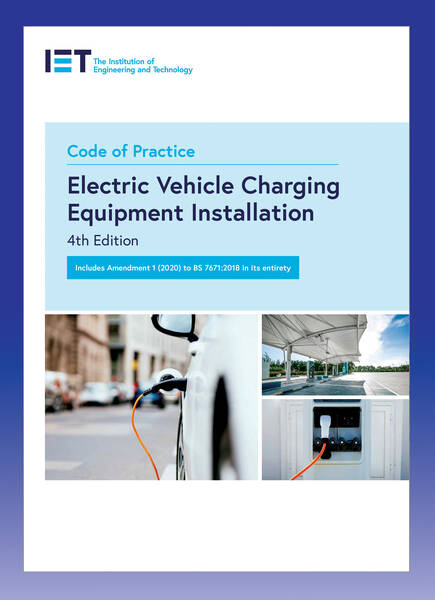IET COP for Electric Vehicle Charging 2020 4th Ed
Product Code: BK EVC20
9781839531804
PIETEVC20
IET COP
for Electric Vehicle Charging 2020 4th Ed
for Electric Vehicle Charging 2020 4th Ed
The Code of Practice provides a clear overview of EV charging equipment, as well as setting out the considerations needed prior to installation and the necessary physical and electrical installation requirements. It also details what needs to be considered when installing electric vehicle charging equipment in various different locations – such as domestic dwellings, on-street locations, and commercial and industrial premises.
This IET Code of Practice provides a clear overview of EV charging equipment, as well as setting out the considerations needed prior to installation and the necessary physical and electrical installation requirements. It also details what needs to be considered when installing electric vehicle charging equipment in various different locations - such as domestic dwellings, on-street locations, and commercial and industrial premises.
The book is paperback and has 128 pages and was published in 2020.
Key changes for the 4th Edition include:
General requirements - updated in line with the very latest amendment to BS 7671 (specifically within Section 722)
On street installations - section updated to reflect a range of situations
Installations at dwellings - section updated to provide greater clarity on domestic installs
Three phase installations - address in more detail within the commercial and industrial section of the code
Vehicle to grid - section updated and expanded providing useful background to this emerging development as well as providing detail on installation issues
Smart infrastructure integration - updated to cover installation considerations that are becoming increasingly complicated as EV charging needs to be compatible and integrated with a range of other systems and installations
Wireless charging - expansion of coverage of this area as its potential begins to be established and realised
This very well established Code of Practice, supported by all the major stakeholders in the industry, is essential reading for anyone involved in the rapid expansion of EV charging points, and those involved in maintenance, extension, modification and periodic verification of electrical installations that incorporate EV charging.
This IET Code of Practice provides a clear overview of EV charging equipment, as well as setting out the considerations needed prior to installation and the necessary physical and electrical installation requirements. It also details what needs to be considered when installing electric vehicle charging equipment in various different locations - such as domestic dwellings, on-street locations, and commercial and industrial premises.
The book is paperback and has 128 pages and was published in 2020.
Key changes for the 4th Edition include:
General requirements - updated in line with the very latest amendment to BS 7671 (specifically within Section 722)
On street installations - section updated to reflect a range of situations
Installations at dwellings - section updated to provide greater clarity on domestic installs
Three phase installations - address in more detail within the commercial and industrial section of the code
Vehicle to grid - section updated and expanded providing useful background to this emerging development as well as providing detail on installation issues
Smart infrastructure integration - updated to cover installation considerations that are becoming increasingly complicated as EV charging needs to be compatible and integrated with a range of other systems and installations
Wireless charging - expansion of coverage of this area as its potential begins to be established and realised
This very well established Code of Practice, supported by all the major stakeholders in the industry, is essential reading for anyone involved in the rapid expansion of EV charging points, and those involved in maintenance, extension, modification and periodic verification of electrical installations that incorporate EV charging.
|
Product Code
Description
|
Price (ex VAT)
Price (inc VAT)
Quantity
|
|---|---|



